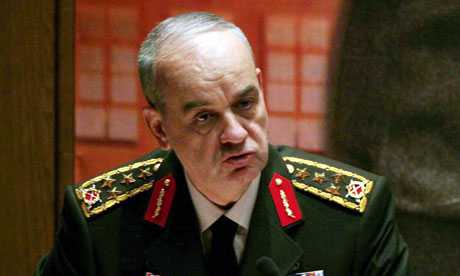The sight of a general like İlker Başbuğ being tried in a civil court is leading to a reappraisal of the army’s role in Turkish society
Kaya Genç
guardian.co.uk

The news came as a shock for many: a Turkish general, arrested. But for some, this week’s detention of İlker Başbuğ, Turkey’s former chief of staff, was a cause for celebration. It seemed to many of us as if Turkey had finally started to get to grips with its militarist culture. After all, Başbuğ is accused of being part of a failed coup against a democratically elected government. So the message sent to Turkey’s military establishment was clear: do not mess with Turkish people’s political choices.
Only a decade ago nobody would believe the sight of a Turkish general being tried in a civil court. In fact, the mere idea would be seen as an absurdity. For it was usually the other way around. People were used to Turkey’s general staff calling the shots by issuing almost daily statements on political matters, threatening Turkey’s dissidents and forcing politicians they found irritating out of office. The military apparatus was a cause of grave fear for politicians who dared not say things that might anger generals. And they had ample cause to worry: the generals once executed a prime minister, after all.
But the times are changing for Turkey’s once mighty and omnipotent commanders. When Başbuğ was detained for his alleged involvement in the coup attempt, it was difficult to separate his case from that of Kenan Evren, who is seen by Turkish socialists and conservatives alike as a man whose character is no better than Augusto Pinochet. If a civil court can successfully try and investigate a recent chief of staff (Başbuğ served from 2008 until his retirement in 2010) why not get to the bottom of things and set up a trial for the mastermind of the US-supported coup of 1980? Evren’s military rule lasted for a horrifying three years, during which time more than half a million people were detained, thousands ruthlessly tortured, others striped of citizenship and as many as 50 executed, including a 16-year-old. In fact, Evren and his generals merely continued a long-established tradition in Turkish military. They thought this was an act to save the state from the irresponsibility of civilians who should never be trusted because of their unruly behaviour.
Now it is time for the generals to get their house in order. Last week an indictment accused the 94-year-old Evren with abuses that amounted to crimes against humanity. Therefore the retirement he enjoys in Turkey’s coastal town of Marmaris may come to a disturbing end if the indictment against him is accepted by the courts this year. Should the trial be opened and he is found guilty, Evren faces life imprisonment without parole. Once symbols of military might and unlimited privileges, two retired generals of the Turkish army now represent the greatest shift of political power in this country’s history. With last year’s referendum, constitutional articles that protected them from persecution were removed and finally it is time for the victims of the 1980 coup to see their torturers being tried.
Both commanders had strong political ideas. A Turkish newspaper characterised Başbuğ as an “informed”, “hawkish”, “cool” soldier, one of the most intellectual generals within the military. Evren was a very different figure, often seen as the anti-intellectual dictator who could not stand any form of opposition. Both men felt uneasy with forms of political dissent and attempts to question their authority were decisively trampled.
“This is the biggest punishment imaginable for me,” Başbuğ said during the court hearings that led to his detention. Without a doubt he has a right to be considered innocent until proven guilty, but the mere sight of a general being tried in a civil court is among the biggest triumphs imaginable for Turkey’s democracy. Gone are the days when people kept their political views to themselves in fear of court cases by the general staff.
Nevertheless, however admirable the investigation of past military crimes proves to be, we should also have a careful look at the current generals who seem to enjoy privileges similar to those of their predecessors. It was only last week when two F16 jets killed 35 civilians that they thought were terrorists trying to cross Iraq’s border with Turkey. There were calls for a national day of mourning, which were silently ignored. Judging from what happened in the meantime, Prime Minister Recep Tayyip Erdogan and his generals did a regrettable job of handling the case. So we should expect the cases of Başbuğ and Evren to be messages of warning to those who are currently in command of Turkey’s military apparatus: in this country nobody is immune to justice and for the mistakes you have made; you will need to answer to Turkish people.

Leave a Reply